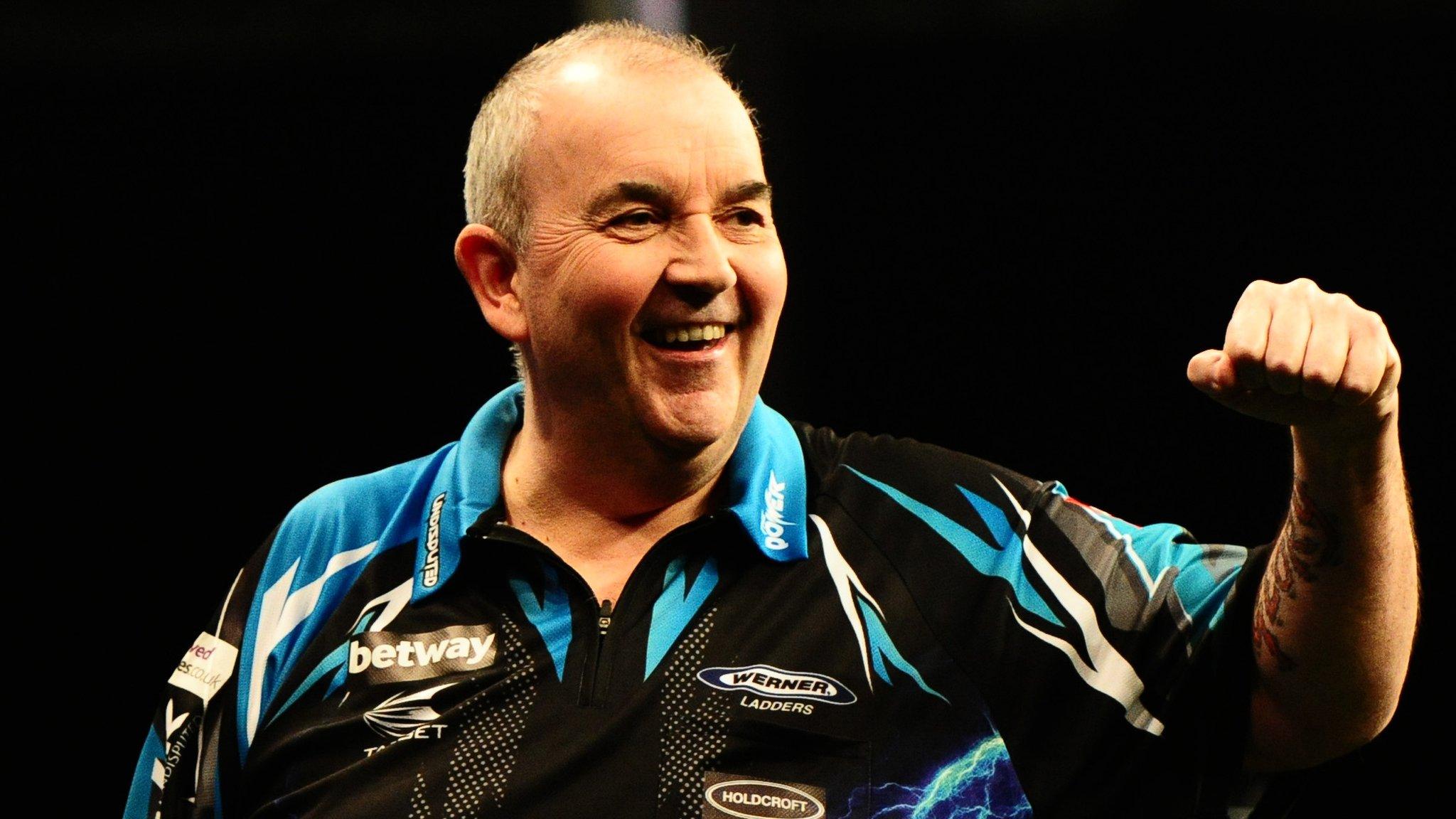Champions League of Darts: Paul Nicholson answers your darts questions
- Published
Highlights: Dominant Taylor wins in Cardiff
Ahead of the return of the Champions League of Darts, live on the BBC this weekend, we asked you the things you have always wanted to know about the sport.
You sent in a large and varied selection of questions - but we needed someone with a bit of inside knowledge to answer the majority.
PDC star and BBC pundit Paul Nicholson, aka The Asset, has been sifting through them...
Adam Page: What are the key things you need to become a professional darts player?
The first thing you need is talent, which for the most part, comes from playing from a young age. On top of that you need a drive to succeed in a very competitive sport. The one thing that people who haven't played professional sport will need to understand is the amount of sacrifice it takes to succeed. In that, I mean it takes sacrifice of time with your friends and family to practice and compete, plus potentially sacrificing the security of a regular job to have the time to do the tour in its entirety. Every professional will have a story of sacrifice that will have made their decision to turn pro very difficult. The rewards are making turning pro very lucrative these days though.
Colin McGregor: Why do some great floor players never do well on stage? It almost seems like a different sport.
Some players feel way more comfortable playing in placid conditions in leisure centres and halls with very few people watching on. When the lights, cameras and big sound are added, some people cannot feel the same control, the same mentality and therefore struggle to perform at their best. Your point of them being different sports is a very valid one, as I have always said that you need a floor game and a stage game to call upon. The gap is closing on the two though, as the introduction of live streaming for floor events and European tournaments is making the transition a lot easier.
Lisa Flaherty: Although the women have their own darts leagues, is there a reason they don't play alongside the men in the PDC or BDO?
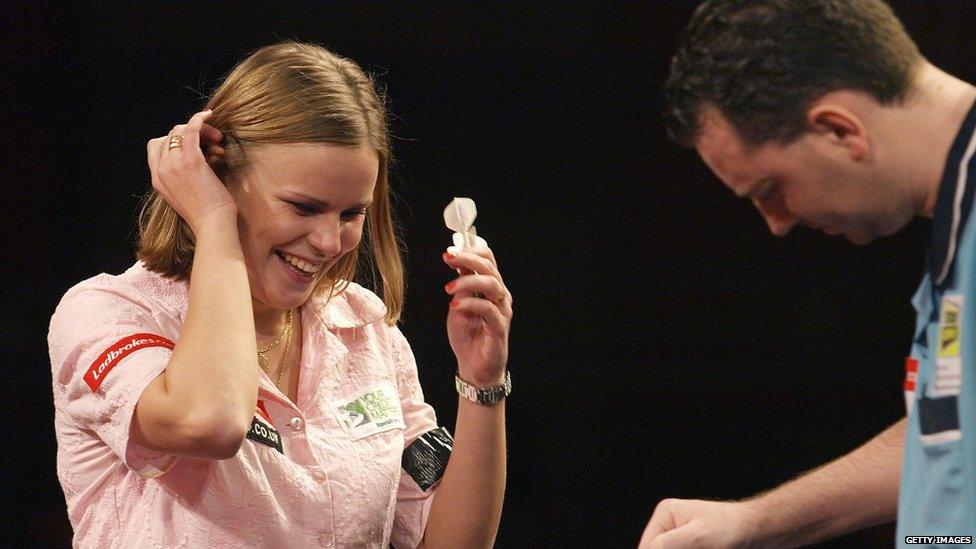
Anastasia Dobromyslova competed alongside the men in the 2009 PDC World Championship
No reason whatsoever. The women are more than welcome to play at any level of the game. There have been examples of women playing in the PDC, namely Anastasia Dobromyslova in The Grand Slam of Darts, World Championship and World Cup. Also, more recently we have seen ladies' world champion, Lisa Ashton, playing on the PDC's second tier circuit, the Challenge Tour, with a lot of wins coming her way. I've said all along that there is no reason for a woman not to be as good as a man, and if they are good enough, they can test themselves against the best and reap the same rewards.
Jordan Walters: On average how long do darts players practise every day?
That differs from player to player. Some of the top professionals don't have to practise at all because they are playing so much competitive darts on tour. However, every player will practise for a designated time before taking the stage, or playing their first match on a tournament day. In preparation for any day though, the majority of players will do a few hours a day to get sharp. Some players like Michael Smith and Mervyn King are noted for their work ethic and have been quoted as putting in as much as eight hours in a day if they feel it is prudent to do so. On the flip side of that, Phil Taylor has always been an advocate for the "never practise the night before a tournament starts" mentality. He believes that allows you to relax more and create a hunger to win.
Keith Miller: What happens to the dartboards that Phil Taylor and the officials all sign on the back?
Phil has done this for years. He sometimes gives it to a player that he competes against as a memento of the match. That usually happens in World Series darts around the world, but most of the time he gives it to someone in the crowd with a set of his match darts. To his credit, he does tend to give the board to children if at all possible.
William Bridge: Do you think winning this year's World Championship would make Phil Taylor have a rethink about retiring?
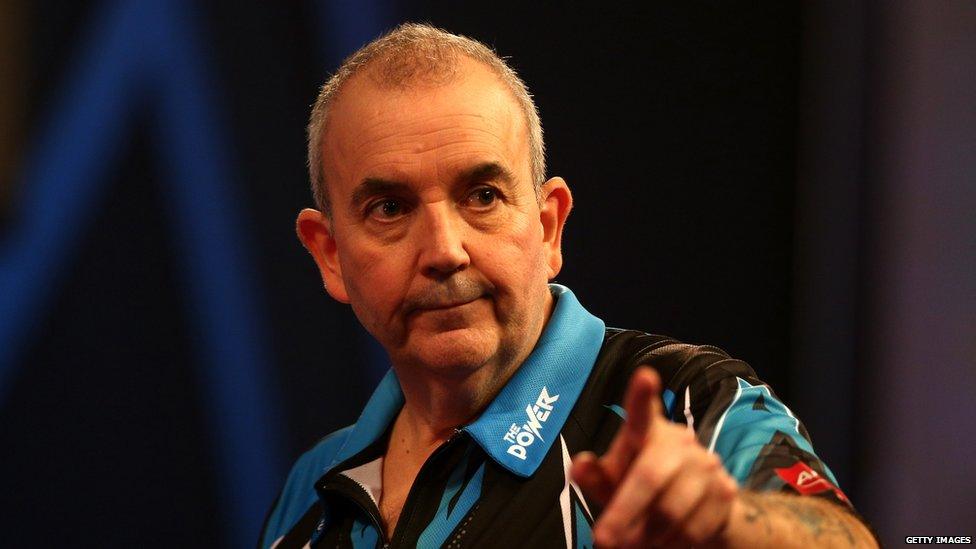
16-time world champion Phil Taylor is set to retire after the 2018 PDC World Championship
A very interesting thought, of which I have spent many an hour contemplating this year. At first I thought that winning another major or another world title would give him the drive to come back and defend it. However, after his withdrawal from next month's World Grand Prix I am fairly convinced that he is ready to walk away from professional darts and leave the sport in our hands. He has said that the travelling is too much now, and with a schedule that is ever increasing for the best players, he is ready to enjoy his latter years potentially just doing some exhibitions and possibly some soft tip darts play if indeed he gets the occasional competitive itch.
Jonathan Jackson: The players always talk about how hot it is when on stage with all the TV lights, but how hot is it exactly?
Depending on the arena, it can reach up to around 40 degrees celsius on stage. During the summer months it gets worse of course because of climate and the fact that we have to limit the use of air conditioning. The reason for that limitation is because the increased air flow makes darts fly inconsistently, and is therefore unfair to the players. As the majority of arenas are larger these days, it isn't as bad, but when you have thousands of fans shouting and becoming boisterous, generating body heat, it can bring the temperature of a stage up dramatically. The players on the whole are ok with it though, as they understand it is easier for the body to move in a supple motion under warm conditions rather than cold conditions when the arm, shoulder, hands and body can shut down a little.
Liam Short: What is the best method for practising darts? E.g. Round the clock?
The amount of practice games out there that can improve your game is astounding. If you want to get better though, the best thing is to continually play against other people and test your skill as well as your competitive edge and calmness under pressure. Simply by practising alone, you may improve ability wise, but you won't improve as a player against others. As for games that can help you improve in practice, 'Bob's 27' is one of my favourites, which is a doubles practice game. This game can be done alone or with others. One other favourable practice game, which is fun, is a game called 'Half it'. The object of this game is to go through all the different segments without missing a target. If you do, your score is halved, but the more you hit the assigned target the more you are rewarded. This isn't just a fun game, it is progressive and can genuinely improve your focus.
Anonymous: How do you control your nerves when aiming for the winning double?
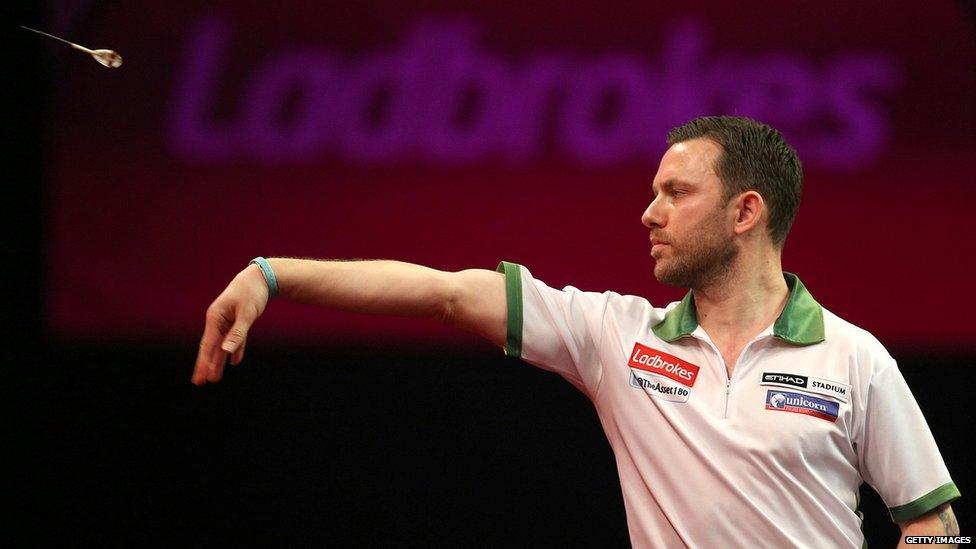
Paul Nicholson won the 2010 Players Championship Finals crown
It's very difficult to do. It takes practice over a period of years to get used to hitting doubles under pressure. However, deep breathing before going for any shot I feel helps greatly in allowing your body and mind to be calm before going for a shot. The shear belief that you are going to hit it is key though. If you have any doubt whatsoever, you will overthink and more than likely miss. If we think less, we play better. Just let your game flow naturally and don't let anyone distract you.
Paul Oliver: Who of the young players (14-18) are going to be stars of the future?
For me, it's great to see so many great young players coming through. Of the guys and girls in the youth ranks, I am particularly impressed with Justin Van Tergouw of The Netherlands as he has grown into a genuine threat to any player now, not just youth players. However, he is still a kid and has a lot of time to learn and get even better. As well as him, there are young players like Rusty-Jake Rodriguez of Austria and Nico Blum of Germany to look out for. In the girls' ranks it's all about Beau Grieves for me. She is a sensational young talent, and could be a world champion by the time she is 21 if she keeps doing what she is doing.
Beau Greaves in 2016: The 12-year-old darts sensation
Who's playing?
The competition is played over two days on Saturday and Sunday at Cardiff's Motorpoint Arena.
It features the top-eight players in the PDC order of merit, split into two groups of four, with the winner picking up a £100,000 cheque.
Saturday afternoon session (13:15 BST)
Peter Wright v Dave Chisnall (Group A)
Gary Anderson v Mensur Suljovic (Group A)
Phil Taylor v Adrian Lewis (Group B)
Michael van Gerwen v Raymond van Barneveld (Group B)
Saturday evening session (18:45)
Second group matches - the afternoon session's winners face each other and the losing players play each other.
Sunday afternoon session (13:00)
Final group matches
Sunday evening session (18:30)
Semi-finals & final
BBC coverage
Jason Mohammad will present live coverage of each session, starting on BBC One at 13:00 BST on Saturday.
Paul Nicholson, Mark Webster and Alan Warriner-Little will be providing in-depth analysis of each match.
There will also be live text coverage, social media, analysis and in-play clips on the BBC Sport website and app on every game.
- Attribution
- Published18 September 2017
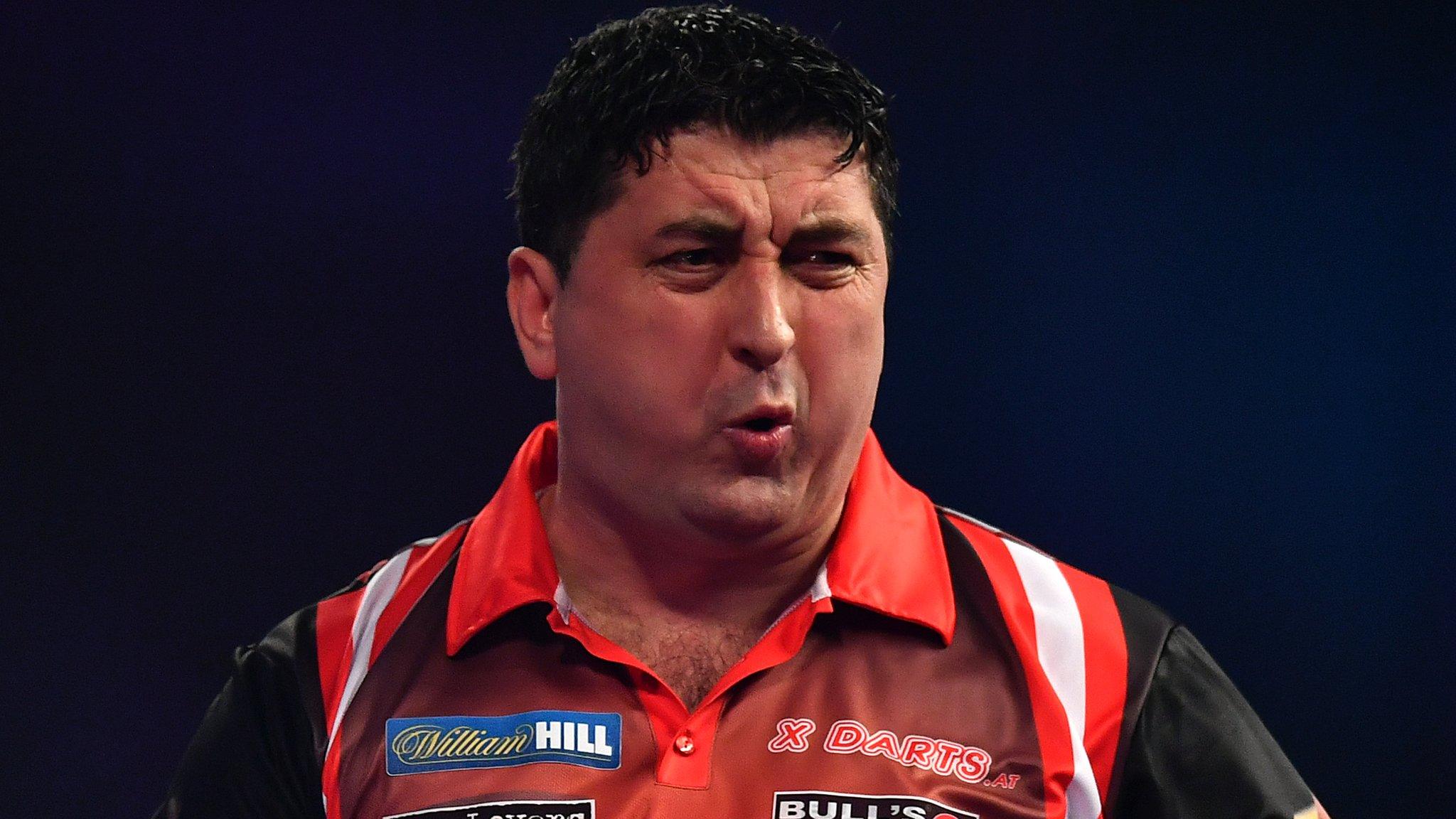
- Attribution
- Published21 June 2017
